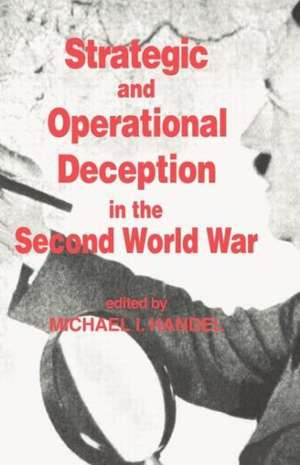Strategic and Operational Deception in the Second World War: Studies in Intelligence
Editat de Michael I. Handelen Limba Engleză Paperback – 11 noi 2004
| Toate formatele și edițiile | Preț | Express |
|---|---|---|
| Paperback (1) | 417.20 lei 6-8 săpt. | |
| Taylor & Francis – 11 noi 2004 | 417.20 lei 6-8 săpt. | |
| Hardback (1) | 1386.19 lei 6-8 săpt. | |
| Taylor & Francis – sep 1987 | 1386.19 lei 6-8 săpt. |
Din seria Studies in Intelligence
-
 Preț: 326.99 lei
Preț: 326.99 lei -
 Preț: 326.49 lei
Preț: 326.49 lei -
 Preț: 382.34 lei
Preț: 382.34 lei -
 Preț: 416.91 lei
Preț: 416.91 lei -
 Preț: 343.32 lei
Preț: 343.32 lei - 26%
 Preț: 821.46 lei
Preț: 821.46 lei - 18%
 Preț: 1111.55 lei
Preț: 1111.55 lei - 26%
 Preț: 849.77 lei
Preț: 849.77 lei - 18%
 Preț: 1111.55 lei
Preț: 1111.55 lei - 25%
 Preț: 354.07 lei
Preț: 354.07 lei - 26%
 Preț: 849.37 lei
Preț: 849.37 lei - 25%
 Preț: 247.87 lei
Preț: 247.87 lei -
 Preț: 447.51 lei
Preț: 447.51 lei - 18%
 Preț: 1279.51 lei
Preț: 1279.51 lei - 18%
 Preț: 1384.61 lei
Preț: 1384.61 lei -
 Preț: 501.87 lei
Preț: 501.87 lei - 25%
 Preț: 825.25 lei
Preț: 825.25 lei - 26%
 Preț: 821.13 lei
Preț: 821.13 lei - 31%
 Preț: 368.15 lei
Preț: 368.15 lei - 18%
 Preț: 1012.10 lei
Preț: 1012.10 lei - 18%
 Preț: 1060.25 lei
Preț: 1060.25 lei - 18%
 Preț: 1119.52 lei
Preț: 1119.52 lei - 26%
 Preț: 821.13 lei
Preț: 821.13 lei -
 Preț: 496.35 lei
Preț: 496.35 lei - 26%
 Preț: 822.76 lei
Preț: 822.76 lei -
 Preț: 450.40 lei
Preț: 450.40 lei - 18%
 Preț: 1113.91 lei
Preț: 1113.91 lei -
 Preț: 443.65 lei
Preț: 443.65 lei - 18%
 Preț: 1224.24 lei
Preț: 1224.24 lei -
 Preț: 465.80 lei
Preț: 465.80 lei -
 Preț: 422.00 lei
Preț: 422.00 lei - 18%
 Preț: 1058.43 lei
Preț: 1058.43 lei - 18%
 Preț: 1391.72 lei
Preț: 1391.72 lei - 15%
 Preț: 456.13 lei
Preț: 456.13 lei - 25%
 Preț: 795.75 lei
Preț: 795.75 lei -
 Preț: 449.41 lei
Preț: 449.41 lei - 18%
 Preț: 1058.79 lei
Preț: 1058.79 lei - 18%
 Preț: 948.21 lei
Preț: 948.21 lei -
 Preț: 286.43 lei
Preț: 286.43 lei -
 Preț: 446.53 lei
Preț: 446.53 lei - 18%
 Preț: 1351.59 lei
Preț: 1351.59 lei
Preț: 417.20 lei
Nou
Puncte Express: 626
Preț estimativ în valută:
79.85€ • 83.14$ • 67.48£
79.85€ • 83.14$ • 67.48£
Carte tipărită la comandă
Livrare economică 10-24 martie
Preluare comenzi: 021 569.72.76
Specificații
ISBN-13: 9780714640563
ISBN-10: 0714640565
Pagini: 360
Dimensiuni: 138 x 216 x 23 mm
Greutate: 0.48 kg
Ediția:1
Editura: Taylor & Francis
Colecția Routledge
Seria Studies in Intelligence
Locul publicării:Oxford, United Kingdom
ISBN-10: 0714640565
Pagini: 360
Dimensiuni: 138 x 216 x 23 mm
Greutate: 0.48 kg
Ediția:1
Editura: Taylor & Francis
Colecția Routledge
Seria Studies in Intelligence
Locul publicării:Oxford, United Kingdom
Cuprins
Preface; Introduction: Strategic and Operational; Deception in Historical Perspective; Operation Starkey 1943: 'A Piece of Harmless Playacting'; German Misapprehensions Regarding Overlord: Understanding Failure in the Estimative Process; The Red Mask: The Nature and Legacy of Soviet Military Deception in the Second World War; American Strategic Deception in the Pacific, 1942-44; A German Perspective on Allied Deception Operations in the Second World War; The Success of Operation Fortitude: Hesketh's History of Strategic Deception
Notă biografică
Michael I. Handel is Professor of National Security Affairs and holder of the Henry L. Stimson Chair of Military Studies at the US Army War College, Carlisle, Pennsylvania. He is one of the founding editors of the quarterly journal Intelligence and National Security and organised the international conference on Intelligence and Military Operations at which the papers in this volume were first read. Among his publications are The Diplomacy of Surprise: Hitler, Nixon, Sadat (1981); Weak States in the international System (1981); and Clausewitz and Modern Strategy(1986).







